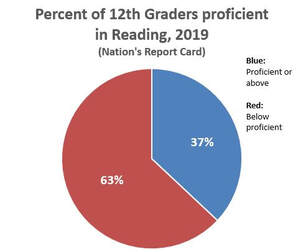 Students were struggling to read BEFORE the pandemic!
Students were struggling to read BEFORE the pandemic! The ACT press release stated,
“The national average ACT Composite score for the high school class of 2022 was 19.8, the lowest average score in more than three decades, according to data released today by ACT, the nonprofit organization that administers the college readiness exam. It is the first time since 1991 that the average ACT Composite score was below 20.0.”
Most of the news media eagerly jumped to blame the pandemic. And yes, if you only read that one statement, you might agree. Afterall, ACT is reporting the lowest scores since 1991, and COVID did play a role. But is COVID the real cause of the problem? Keep reading.
As Janet Godwin, ACT CEO goes on to explain in the news release, there’s a bigger problem than just the pandemic. She explains,
“This is the fifth consecutive year of declines in average scores, a worrisome trend that began long before the disruption of the COVID-19 pandemic….”
That’s right, scores were declining before COVID even existed. Scores have been declining since 2017. Godwin goes on to clarify her reason for concern,
“The magnitude of the declines this year is particularly alarming, as we see rapidly growing numbers of seniors leaving high school without meeting the college-readiness benchmark in any of the subjects we measure. These declines are not simply a byproduct of the pandemic. They are further evidence of longtime systemic failures that were exacerbated by the pandemic.”
Indeed, she insists that we can’t just go back to the way things were before COVID:
“A return to the pre-pandemic status quo would be insufficient and a disservice to students and educators. These systemic failures require sustained collective action and support for the academic recovery of high school students as an urgent national priority and imperative.”
Godwin clearly states that the problem is not just COVID. Yes, COVID contributed. The problem, however, is a long history of failure. In education, the term “systemic failure” means the school’s ability to help those in need. This includes special needs students as well as students who are failing because of teaching methods that do not meet their learning requirements.
“Slightly less than one-third of ACT-tested graduates in the class of 2022 (32%) met at least three out of four ACT College Readiness Benchmarks. More than 40% of ACT-tested graduates in the class of 2022 (42%) met none of the benchmarks.”
We do not yet have the Nation’s Report Card scores for 2022 for high school students, but let’s go back and look at 2019. The Nation’s Report Card only shows data from 1992 to 2015 for 12th graders, but for that period, there is no significant improvement in reading scores—almost a total stagnated flat line. COVID did not exist from 1992 to 2015. We must look for something besides COVID to blame. The blame lies with teaching methods in the classroom.
What will it take to convince school administrators and politicians that we have a “teaching method” problem? As with the 4th graders, it’s not just COVID. It’s the way we are teaching in the schools. The effect of failing teaching methods starts on Day 1 and follows students all the way through high school.
Followers of my blog have seen how poor teaching methods have harmed children who are learning to read.
Earlier Post: Why Does Phonics Education Fail?
 RSS Feed
RSS Feed
